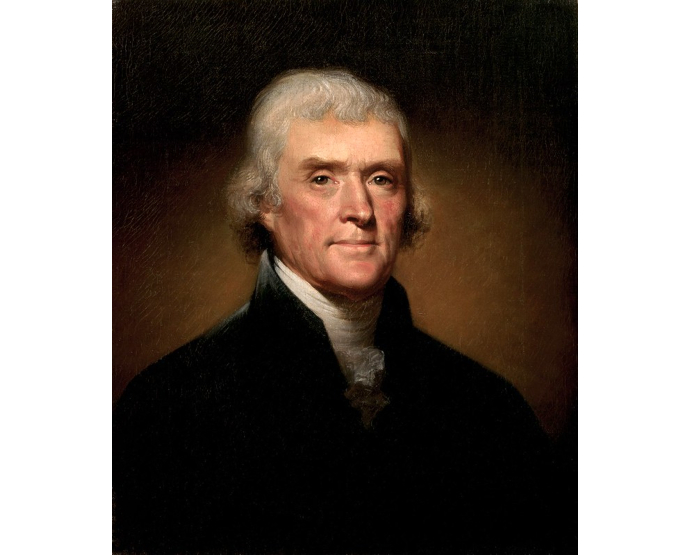Thomas Jefferson, the famous Rembrandt Peale portrait.
Thomas Jefferson, the original Democrat, and Fourth of July
by Eric Jackson, from the Democrats Abroad Global Seniors Caucus newsletter
Juneteenth, when these words were written, is the anniversary of that June 19th, 1865 in Galveston, Texas, when – after an intentional delay to get one more cotton harvest in under slavery — the US Army assembled local black folks and told them that they were no longer slaves. It’s rightfully a liberation day to celebrate, but it also has an aspect of betrayal to it.
History gets like that, with contradictions and “other sides,” and to this day it gives those with no education or sense of history and people with hostile intentions their opportunities to deny and denigrate people and laws that should be held in esteem. Perhaps no other day is more symbolic than the Fourth of July. Perhaps there are no greater angles of attack than the sad legacies of conquest and often enough genocide against North America’s original nations and the legacy of African slavery.
Consider Thomas Jefferson, the principal author of the Declaration of Independence. But that’s probably not even his greatest contribution to the USA. As governor of Virginia he promulgated a law protecting religious freedom, later the template for that part of the Constitution’s First Amendment. As a private donor he created the Library of Congress. As president he made a deal with Napoleon — the Louisiana Purchase that expanded the United States from a coastal strip nation to a vast continental power. To explore the purchased territory he sent out the Lewis and Clark Expedition, doing much to establish the young country as a world scientific power. Throughout his presidency Jefferson patronized the experiment of Eli Whitney – a terrible boondoggle by many lights — in manufacturing muskets with interchangeable parts. The result was a big stride toward the establishment of the United States as both an industrial and military power. Jefferson adopted the law of the sea doctrines of the Dutch jurist Hugo Grotius, and fought a frustrating war, complete with a hostage crisis, with North African powers to uphold the concept of the high seas as international waters which any country’s ships could navigate. That became a cornerstone of US trading and naval power.
But Jefferson was a slave owner, over the course of his life the owner of some 600 people. When he married, his wife brought slaves into the estate. When she died he inherited them including a girl named Sally Hemings, who was the daughter of a relationship between his father-in-law and a slave. Sally was thus his wife’s half-sister and he took her on a diplomatic mission to France with him. In other times and places one might have called Sally Hemings Thomas Jefferson’s common law wife, but in Virginia until the 1960s interracial marriages were illegal. Jefferson fathered several children with Hemings, four of whom survived into adulthood. All very quietly due to the laws and social mores of the times, Sally Hemings and her four adult children by Thomas Jefferson all died as free individuals. But the man was a slave owner.
The Louisiana Purchase? It ultimately meant conquest and misery for the Lakota and many other nations. It also lent itself to the rise of an economic superpower.
So, do Democrats reject the founder of our party, Thomas Jefferson, and the Fourth of July that celebrates one of his life’s great works?
Not at all. We recognize him as a man of his times. We recognize him as a champion of freedom of thought and expression that lets us ponder such things. We resist ongoing Republican moves to prohibit teaching and discussion of the complex history of our race relations as “CRT.” We are stronger for our embrace of history. Leave the bad fiction to the GOP. Our mature understanding of where our party and nation have been defeated “reality TV” in 2020, and it’s a key to America’s further progress as a nation.
A popular enough meme these days. But if you get into Thomas Jefferson’s written down thoughts, he probably would not have disagreed with it. In an 1816 letter, the by then former president wrote: “I am certainly not an advocate for frequent and untried changes in laws and constitutions. I think moderate imperfections had better be borne with; because, when once known, we accommodate ourselves to them, and find practical means of correcting their ill effects. But I know also, that laws and institutions must go hand in hand with the progress of the human mind. As that becomes more developed, more enlightened, as new discoveries are made, new truths disclosed, and manners and opinions change with the change of circumstances, institutions must advance also, and keep pace with the times.”
Also read: The Truth about Thomas Jefferson and Sally Hemings
Contact us by email at fund4thepanamanews@gmail.com
To fend off hackers, organized trolls and other online vandalism, our website comments feature is switched off. Instead, come to our Facebook page to join in the discussion.
These links are interactive — click on the boxes












